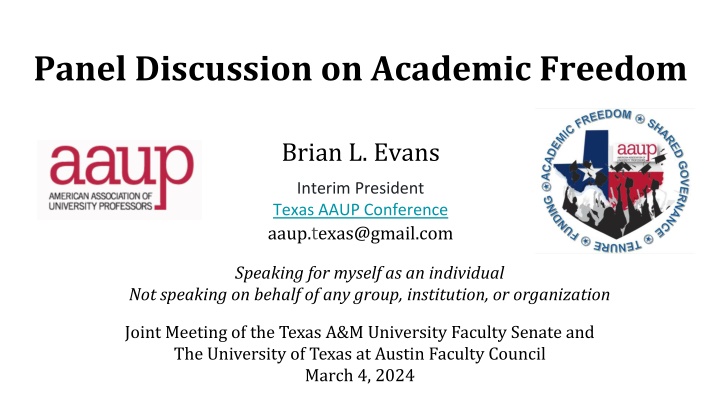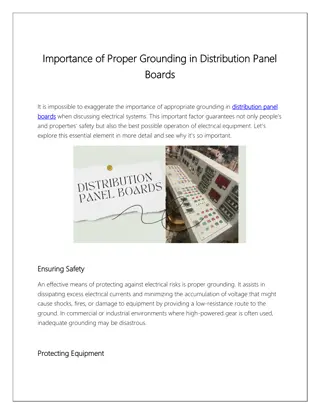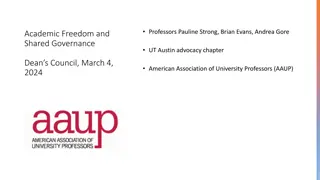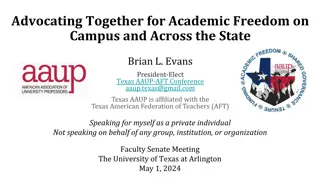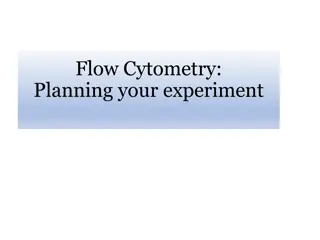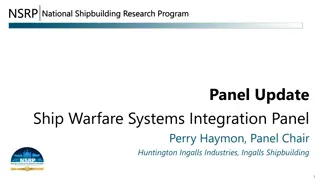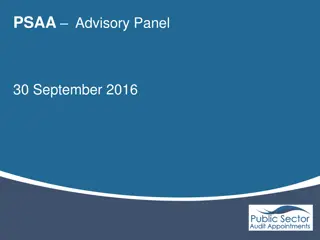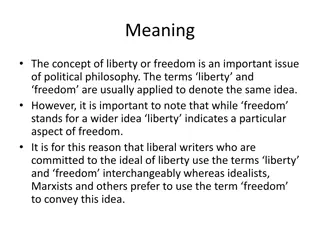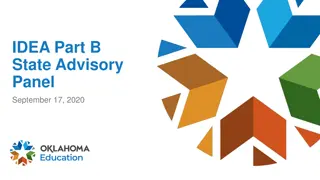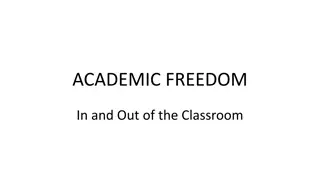Panel Discussion on Academic Freedom
Academic freedom is a crucial aspect of higher education, enabling teachers to innovate, explore diverse viewpoints, and facilitate critical thinking. Organizations like AAUP and AAC&U advocate for shared governance and economic security to uphold academic freedom. The 1940 joint statement highlights the importance of freedom in research, teaching, and governance, with safeguards like tenure and due process. Promoting viewpoint diversity and preparing students for successful careers are central to upholding academic freedom.
Download Presentation

Please find below an Image/Link to download the presentation.
The content on the website is provided AS IS for your information and personal use only. It may not be sold, licensed, or shared on other websites without obtaining consent from the author.If you encounter any issues during the download, it is possible that the publisher has removed the file from their server.
You are allowed to download the files provided on this website for personal or commercial use, subject to the condition that they are used lawfully. All files are the property of their respective owners.
The content on the website is provided AS IS for your information and personal use only. It may not be sold, licensed, or shared on other websites without obtaining consent from the author.
E N D
Presentation Transcript
Panel Discussion on Academic Freedom Brian L. Evans Interim President Texas AAUP Conference aaup.texas@gmail.com Speaking for myself as an individual Not speaking on behalf of any group, institution, or organization Joint Meeting of the Texas A&M University Faculty Senate and The University of Texas at Austin Faculty Council March 4, 2024
American Association of University Professors AAUP Founded in 1915 and has 45,000 members Champions academic freedom, advances shared governance, and organizes all faculty to promote economic security and quality education Affiliated with American Federation of Teachers (1.7M members including 148,000 professors) Aug. 2022 Texas AAUP Members at 75 public/private colleges/universities 25 chapters including Texas A&M and UT Austin Gives training on academic freedom/shared governance Works with Faculty Senates and standing committees Encourages members to run for Faculty Senate Community and Legislative advocacy as private citizens Follow us @AAUP Follow us @ TexasAAUP
1940 Joint AAUP/AAC&U Statement of Principles on Academic Freedom & Tenure (2600 words) American Association of Colleges & Universities (AAC&U): 860+ institutions including UT Austin and Texas A&M University Academic Freedom for teachers consists of interrelated elements freedom to explore all avenues of scholarship, research, and creative expression and to publish the results of such work freedom to discuss all relevant matters in the classroom freedom from institutional censorship or discipline when speaking or writing as participants in the governance of an educational institution freedom from institutional censorship when speaking or writing as a citizen Free inquiry, free expression, and open dissent are critical for student learning and the advancement of knowledge 1940 Statement: https://www.aaup.org/report/1940-statement-principles-academic-freedom-and-tenure
1940 Joint AAUP/AAC&U Statement of Principles on Academic Freedom & Tenure Academic freedom empowers teachers to bring the latest breakthroughs into the classroom innovate in scholarly research and creative endeavors develop and disseminate new knowledge from all viewpoints, including conservative, moderate, liberal, and apolitical (viewpoint diversity) help students develop the critical thinking, knowledge, training, and professional networks for successful careers Critical thinking is a required course outcome by THECB. [2] Safeguards include tenure, due process, shared governance [2] Texas Higher Ed. Coordinating Board, Lower Division Academic Course Guide Manual, Spring 2018.
1940 Joint AAUP/AAC&U Statement of Principles on Academic Freedom & Tenure (2600 words) Academic Freedom (emphasis is mine) 1.Teachers are entitled to full freedom in research and in the publication of the results, subject to the adequate performance of their other academic duties; but research for pecuniary return should be based upon an understanding with the authorities of the institution. 2.Teachers are entitled to freedom in the classroom in discussing their subject, but they should be careful not to introduce into their teaching controversial matter which has no relation to their subject.4Limitations of academic freedom because of religious or other aims of the institution should be clearly stated in writing at the time of the appointment.5 3.College and university teachers are citizens, members of a learned profession, and officers of an educational institution. When they speak or write as citizens, they should be free from institutional censorship or discipline, but their special position in the community imposes special obligations. As scholars and educational officers, they should remember that the public may judge their profession and their institution by their utterances. Hence they should at all times be accurate, should exercise appropriate restraint, should show respect for the opinions of others, and should make every effort to indicate that they are not speaking for the institution .
Texas A&M System 12.01 Academic Freedom, Responsibility and Tenure 1. ACADEMIC FREEDOM (emphasis is mine) 1.1 Institutions of higher education exist for the common good. The common good depends upon an uninhibited search for truth and its open expression. Hence, it is essential that each faculty member be free to pursue scholarly inquiry and to voice and publish individual conclusions concerning the significance of evidence that the faculty member considers relevant. Each faculty member must be free from the corrosive fear that others, inside or outside the academic community, because their vision may differ, may threaten the faculty member's professional career or the material benefits accruing from it. 1.2 Each faculty member is entitled to full freedom in the classroom in discussing the subject that the faculty member teaches but should not introduce controversial matter that has no relation to the classroom subject. Each faculty member is also a citizen of the nation, state and community; and when speaking, writing or acting as such, must be free from institutional censorship or discipline, subject to academic responsibility. In such instances, the faculty member should clearly state that the faculty member is not speaking for the system academic institution 2. ACADEMIC RESPONSIBILITY OF FACULTY MEMBERS
UT Regents Rule 31004 Rights and Responsibilities of Faculty Members Sec. 1 Freedom in Research. Faculty members are entitled to full freedom in research and in the publication of the results. Sec. 2 Freedom in the Classroom. Faculty members are entitled to freedom in the classroom in discussing his or her subject, but are expected not to introduce into their teaching controversial matter that has no relation to his or her subject. Sec. 3 Clarification of Role. Faculty members are citizens, members of learned professions, and officers of an educational institution supported by the State of Texas. When the faculty member speaks or writes as a citizen, he or she should be free from institutional censorship or discipline, but should make it plain that the faculty member is not an institutional spokesperson . RR 31004: https://www.utsystem.edu/board-of-regents/rules/31004-rights-and-responsibilities-of-faculty-members
Panelists and Questions Prof. Brian Evans (UT) Electrical and Computer Engineering; Faculty Council Chair 2019-20; Academic Freedom Committee; Texas AAUP Interim President; aaup.texas@gmail.com Prof. Liliana Garces (UT) Educational Leadership and Policy, and Law School; how legal and education systems shape educational opportunity and create inequality; liliana_garces@utexas.edu. Could you give an example of how you have benefited as an individual faculty member from academic freedom? What are the concerns or dangers of what might infringe on academic freedom? Could you give an example of how your university has strengthened academic freedom? Prof. Dale Rice (A&M) Communication & Journalism; Faculty Senate Speaker twice; Task Forces on Academic Freedom and Faculty Advocacy. dalerice@tamu.edu. All presenters are speaking for themselves as private individuals
